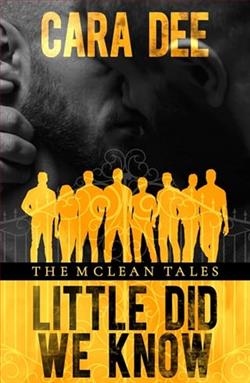Page 35 of Prize of the Warlord
“Two of the warlords are here already, and the third is arriving within the hour,” the woman says, reverting back to the Common Tongue. “I put them in the meeting hall and gave them food and drink. You sent for them?”
“Zeha sent hawks for them, yes,” he replies. “Have her birds returned?”
“All but one are back in the aerie.”
“One is still out?” The Warlord frowns. “Do you think the storm took it down?”
“The hawks know when and how to take shelter,” answers the woman. “It should return soon. Or perhaps she had another errand for it.”
He scowls deeper, but then he seems to shake off his concern. “I will greet the other warlords. Take the prisoner to my lodge.”
“Gladly.”
I didn’t see Zeha send out those messenger hawks, but I’m guessing when she sent messages to the warlords, she also sent one to my parents and Prince Havil. What ransom did Zeha ask for? Is it a price to which the Warlord would agree?
As he strides away toward a long, low building, the rosy-cheeked woman beckons me. “Come, child.”
I want to snap that I’m not a child, no matter how thin and small I may look. But I restrain myself and walk to her. Kaja prowls beside me, her head low. Her posture is almost defensive.
I glance back, concerned for the Warlord’s horse, but one of the village boys is already leading it along behind us. I’m glad. The poor creature deserves a warm shelter, some food, and a long rest. Three things I hope to have as well, when I reach the Warlord’s lodge.
41
We walk through the village, past tidy homes built of logs and plaster and thatch. A few have walls of red-clay bricks. Most of them are patched in places, sealed with mud and mortar to keep out the wind. It is a solid, attractive settlement, as solid and attractive as the Warlord himself. But the weather-beaten faces of its people and the hate in their eyes when they look at me testify of hardship and suffering. This is a place devoted to the basics of survival, with few items of art, beauty, or comfort beyond what is necessary to keep out the cold. Herbs and medicines must be difficult to come by here, not to mention grain and fresh produce.
“There was a healer,” I say suddenly to the woman guiding me. “He came twice, once for me and once for the Warlord. Does he live here?”
“We have one healer here—Mer Azatha,” says the woman. “But there is a healer who lives on the border of the Lower Bloodsalt, near the mountains. He has a cabin there, built among the limbs of great trees. He serves the raiding parties returning from the southern lands. Makes good money for his work, too. He does not come this far north.”
“Oh.”
“And why did the Warlord need a healer?”
“He was injured fighting thejäkel,” I mutter.
“Thejäkel? But he wears the bones, always. Why was he fighting with them?”
“Because I ran away and pulled the bones out of my hair.” I wince, touching the bits of bone still dangling in my loose braids.
Shaking her head, the woman mutters something that I’m sure isn’t complimentary.
At the end of the village, on a low rise, stands a lodge larger and sturdier than all the others. Unlike the other cabins, its posts and lintel are decorated with painted designs.
The boy with the Warlord’s horse has been following us, but now he turns aside, leading the stallion to a large stable nearby. Kaja pads away from me too, prowling the outside of the lodge, headed around back. Without her warm fur, the chill air bites my fingers, and I tuck them under my arms.
The woman ahead of me pushes open one of the lodge’s double doors. “Inside.”
I venture past her, into a huge room of golden firelight and rich wooden beams, sturdy chairs and thick cushions, draped blankets and woven floor coverings. More stenciled art covers the posts and ceiling, and the walls hold wooden brackets with weapons and tools of every kind. There are painted cabinets and heavy tables, stools and benches.
“Sometimes village gatherings are held here, when the meeting hall is too cold,” says my guide. “Come.” She grips my arm just above the elbow and tows me through the front room. “The Warlord’s room is there.” She points to a nearby door. “His father sleeps over there.” The second door she indicates is all the way across the space.
“His father?” For some reason I hadn’t imagined the Warlord having parents. He seems so self-sufficient. “His father lives, and yet he’s the village leader?”
“His father was never a leader,” the woman says grimly. “And there’s no need for you to concern yourself with the Warlord’s personal affairs. You’re a captive, not a guest. You’d do well to remember it. Now come.” She jerks my arm harder, throwing open a door in a back corner and shoving me inside.
The room I stumble into is dark and chilly, barely touched by the heat from the big front room. It’s crammed with wooden crates and cloth sacks. Swords, spades, and pitchforks lean against the walls. There’s a central post, and from it dangle a pair of manacles. Another pair of cuffs lie on the floor.
“The former warlord kept prisoners here. And Zeha used the room before she moved into her own hut. It’s mostly storage now.” The woman shoves me back against the post and jerks my hands up, above my head. I’m too startled to fight her—not that I could—her strength flows through every movement. She’s taller and more powerful than I am.















